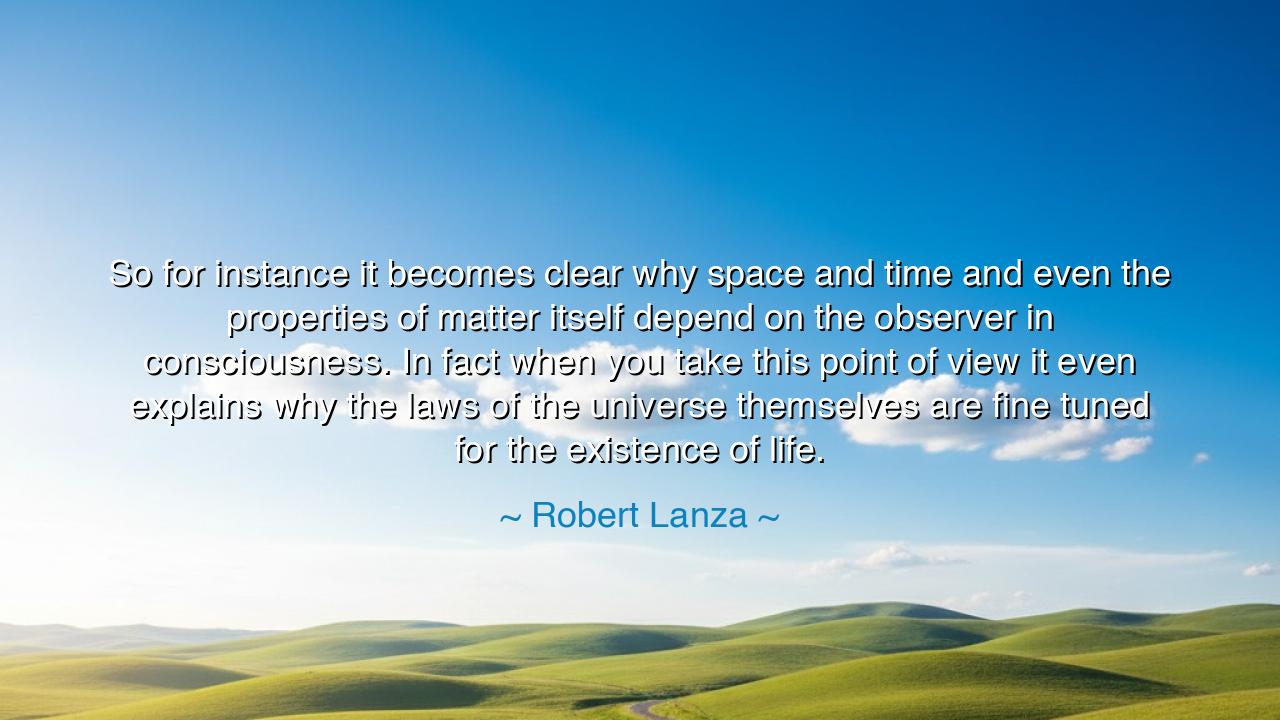
So for instance it becomes clear why space and time and even the
So for instance it becomes clear why space and time and even the properties of matter itself depend on the observer in consciousness. In fact when you take this point of view it even explains why the laws of the universe themselves are fine tuned for the existence of life.






Hear, O child of wonder, the profound words of Robert Lanza: “So for instance it becomes clear why space and time and even the properties of matter itself depend on the observer in consciousness. In fact, when you take this point of view it even explains why the laws of the universe themselves are fine tuned for the existence of life.” These are not idle musings, but a vision drawn from the depths of science and philosophy alike, where physics meets the mysteries of spirit. Lanza speaks of biocentrism, a bold idea that places life and consciousness not as accidents of the cosmos, but as central to its very design.
To say that space and time depend on the observer is to turn upside down the ordinary way of thinking. We are taught that the universe exists independently, a machine grinding forward whether we watch or not. But quantum physics has shown that observation itself alters reality: particles exist as probabilities until they are seen, and only then do they take form. Thus, Lanza declares that consciousness is not a shadow of matter, but the light by which matter is revealed. Without the observer, there is no stage of space, no flow of time—only potential awaiting awareness.
Consider the tale of the double-slit experiment, where light behaves as both wave and particle. When unobserved, it spreads in possibility; when observed, it collapses into form. This experiment, repeated countless times, whispers the same truth that Lanza proclaims: the universe is not merely out there, indifferent and fixed. It is participatory, woven together with the act of perception itself. The cosmos is not a stage upon which life accidentally appears; rather, life and consciousness are threads that bind the fabric of the cosmos together.
This, then, explains the mystery of the universe’s fine-tuning. Why are the laws of physics so delicately balanced, so perfectly set that stars can burn, atoms can bind, and life can arise? Many have marveled at this as coincidence, others as divine design. Lanza offers another answer: the laws appear fine-tuned for life because it is through life, through consciousness, that they are revealed at all. The observer does not merely watch the universe; the observer is the reason it manifests in the form that can sustain and recognize life.
Think, O listener, on the great traditions of wisdom. The sages of the East long ago proclaimed that the universe is maya, an illusion shaped by perception. The mystics of the West spoke of man as the image of God, a mirror of the cosmos itself. What Lanza speaks through the language of modern science is an echo of these ancient voices: that the soul of the universe cannot be separated from the soul of the observer. To awaken to this is to see that life is not accidental dust but the very key to existence.
Yet beware: such knowledge is not for pride, but for reverence. If consciousness shapes the universe, then our thoughts, our awareness, our choices hold infinite weight. The way we live, the way we see, becomes part of the great unfolding of reality itself. This is not a burden, but a call to live with care, to honor both the seen and the unseen, to treat existence itself as sacred.
Therefore, take this teaching into your heart: the laws of the universe are not cold and indifferent, but intertwined with the miracle of your own awareness. You are not a passive guest in creation, but a participant in its becoming. Guard your consciousness well—fill it with truth, with compassion, with wonder. For as you observe, so too does the universe take shape. And in this mystery lies both the glory and the responsibility of life.






AAdministratorAdministrator
Welcome, honored guests. Please leave a comment, we will respond soon